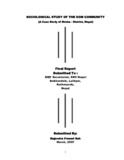Please use this identifier to cite or link to this item:
https://hdl.handle.net/20.500.14356/723Full metadata record
| DC Field | Value | Language |
|---|---|---|
| dc.contributor.author | Sah, Rajendra Prasad | - |
| dc.date.accessioned | 2013-08-19T22:07:42Z | - |
| dc.date.accessioned | 2022-11-08T10:19:03Z | - |
| dc.date.available | 2013-08-19T22:07:42Z | - |
| dc.date.available | 2022-11-08T10:19:03Z | - |
| dc.date.issued | 2007 | - |
| dc.identifier.uri | http://103.69.126.140:8080/handle/20.500.14356/723 | - |
| dc.description.abstract | Executive Summary: The aim of this study is to describe the ethnography of the Dom community, a socially excluded caste group of Terai, Nepal. For this purpose, one municipality and nine VDCs of Siraha-District were selected purposively. There are total 72 households of the Dom Community and their total population is 327(male: 173, female: 154). Descriptive and analytic methods are used in this study. Mainly primary data are used focusing on qualitative in nature. The Dom community is traditionally an occupational caste. Their main occupation is making a variety of baskets and sell them. They are Sudra and known as Achhut (Untouchable). They migrated from India to Nepal about five or six generations back. The Dom of Siraha-District is also migrated from India and they first settled at Madar, near headquarter of Siraha-district. The Dom is Hindu. They follow Hindu religion and worship Hindu Gods and Goddesses. The festivals of the Dom are similar with other Hindu castes. They mainly celebrate Dashain, Tihar, Maghe Sakranti, Chhatha Parva, Naga Panchami, Chaurchan, Jur sital, Faguwa (Holi or Hori). The Dom is poor and exploited by higher castes. Most of them are landless and uneducated. Therefore, they are backward in every field. In the study-sites, it is difficult to see their traditional type of dresses and ornaments. They speak Maithili language. However, caste based discrimination is not so rigid as it was in the past, but some discriminations can be seen clearly. The Dom is not allowed to enter the home of upper castes. They have separate tube-wells for their own use because they are not allowed to fetch water either from the private or public tube-wells. The Doms are not found actively participating in local and national political affairs. Most of them are only voters. They have not access in local resources management. They are not aware about to get their citizenship and to register the vital events. There is satisfactory trend of getting health services from governmental health offices in the Dom community. Different types of NGOs/INGOs are found working to improve and enhance the life style of Dalits, but there is not seen any positive sign of improvement in the socio-economic condition of the Dom's life style. Gradually, social awareness is improving and enhancing among the Dom community of the study area due to the effect of modernization. | en_US |
| dc.language.iso | en_US | en_US |
| dc.publisher | SIRF Secretariat, SNV Nepal | en_US |
| dc.subject | Sociological study of the Dom community | en_US |
| dc.subject | A Case Study of Siraha - District | en_US |
| dc.subject | Nepal | en_US |
| dc.subject | Dom Community | en_US |
| dc.title | Sociological study of the Dom community (A Case Study of Siraha - District, Nepal) | en_US |
| dc.type | Technical Report | en_US |
| Appears in Collections: | NHRC Research Report | |
Files in This Item:
| File | Description | Size | Format | |
|---|---|---|---|---|
| 417.pdf | Full Report. Download | 822.58 kB | Adobe PDF |  View/Open |
Items in DSpace are protected by copyright, with all rights reserved, unless otherwise indicated.
